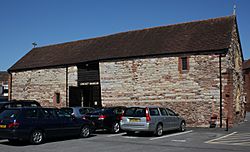Taunton Priory facts for kids

The Old Priory Barn, now used as a museum, is the only surviving building.
|
|
| Monastery information | |
|---|---|
| Other names | Priory of St Peter and St Paul |
| Order | Augustinian canons |
| Established | c1115 |
| Disestablished | 1539 |
| Site | |
| Location | Taunton, Somerset, England |
| Coordinates | 51°01′05″N 3°05′54″W / 51.018083°N 3.098198°W |
Taunton Priory was an important religious building in Taunton, Somerset, England. It was also known as the Priory of St Peter and St Paul. A "priory" is a type of monastery, which is a place where religious people live and work together.
This priory was home to a group called Augustinian canons. These were priests who lived by a strict set of rules, similar to monks.
The Priory's Beginning
Taunton Priory was started around the year 1115. It was founded by a powerful man named William Gyffarde. He was the Bishop of Winchester, which is a very important church leader. He was also the Chancellor of England, a top government official.
The priory was built in Taunton because the town was a "manor" belonging to the Bishops of Winchester. A manor was a large estate or area of land controlled by a lord, in this case, the Bishop.
Another person, Henry de Blois, is also mentioned as helping to start the priory. He was William Gyffarde's successor as Bishop and was also the brother of King Stephen. It is not fully clear what his role was in building the priory.
What Happened to the Priory?
Taunton Priory was closed down in 1539. This happened during a time known as the Dissolution of the Monasteries. This was when King Henry VIII decided to close many religious houses across England.
After it was closed, most of the priory buildings were completely taken down. Only one building survived: the Priory Barn.
What Can We See Today?
The Priory Barn is still standing today. It was built in the late 1400s or early 1500s, replacing an older barn from the 1200s or 1300s.
Today, the Priory Barn is used by the Taunton Cricket Club. It is also home to the Somerset Cricket Museum.
Near the priory, there was once a medieval fish farm called a "vivarium." This was a special pond or tank used to keep fish. This area is now a public park called Vivary Park.
In 2005, archaeologists found parts of the old priory church and other buildings. They were doing this work before new flats were built in the area. They uncovered the western part of the church and the cloister, which was an open courtyard.
 | William L. Dawson |
 | W. E. B. Du Bois |
 | Harry Belafonte |

